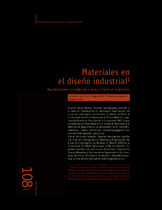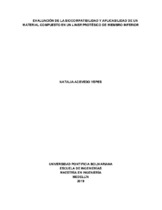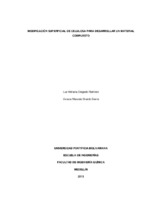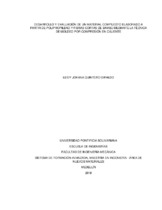| dc.contributor.author | Mejía Gómez, Carolina | |
| dc.contributor.author | Valencia, Andrés Hernando | |
| dc.coverage.spatial | Seccional Medellín | spa |
| dc.date.accessioned | 2020-12-14T16:58:29Z | |
| dc.date.available | 2020-12-14T16:58:29Z | |
| dc.date.issued | 2010 | |
| dc.identifier.uri | http://hdl.handle.net/20.500.11912/7226 | |
| dc.description | p. 108 - 117 | spa |
| dc.description.abstract | En la actualidad existe un cambio constante de productos, independientemente del ciclo de vida del mismo, que implica simultáneamente el desecho de materiales. Por esta razón es necesario diseñar materiales híbridos (Ashby, 2005) a partir de materias primas cuya vida útil sea congruente al tiempo de uso de los productos, incluyendo materiales que permitan la reutilización, el reciclaje y el procesamiento, y que al mismo tiempo disminuyan el impacto ambiental. A partir de esta problemática, este artículo plantea una metodología para el diseñador que le permita diseñar materiales a partir de materias primas ya existentes que cumplan con los requerimientos funcionales mencionados. | spa |
| dc.description.abstract | A constant change of product is currently demanded regardless of the object life cycle itself, implying simultaneously the disposal of materials. For this reason it is necessary to design hybrid materials (Ashby, 2005) from resources whose useful life might be congruet to product use time, including materials that allow reuse, recyclig and processing, and at the same time, that reduce environmental impact. Based on this problem, this article states a methodology that allows designers to designers to desing new materials out of existing ones meeting the abovementioned requirements. | spa |
| dc.format.mimetype | application/pdf | |
| dc.language.iso | spa | |
| dc.publisher | Universidad Pontificia Bolivariana | spa |
| dc.relation.ispartof | Iconofacto | spa |
| dc.rights | Attribution-NonCommercial-NoDerivatives 4.0 International | * |
| dc.rights.uri | http://creativecommons.org/licenses/by-nc-nd/4.0/ | * |
| dc.subject | Diseño de materiales | spa |
| dc.subject | Materiales híbridos | spa |
| dc.subject | Reciclaje de materiales | spa |
| dc.subject | Reutilización de materiales | spa |
| dc.subject | Materia prima | spa |
| dc.subject | Material design | spa |
| dc.subject | Hybrid materials | spa |
| dc.subject | Material recycling | spa |
| dc.subject | Material reusing | spa |
| dc.subject | Raw materials | spa |
| dc.title | Materiales en el diseño industrial: una herramienta metodológica para el diseño de materiales | spa |
| dc.type | article | spa |
| dc.rights.accessRights | openAccess | spa |
| dc.type.hasVersion | publishedVersion | spa |
| dc.description.sectional | Medellín | spa |
| dc.identifier.instname | instname:Universidad Pontificia Bolivariana | spa |
| dc.identifier.reponame | reponame:Repositorio Institucional de la Universidad Pontificia Bolivariana | spa |
| dc.identifier.repourl | repourl:https://repository.unab.edu.co/ | |





